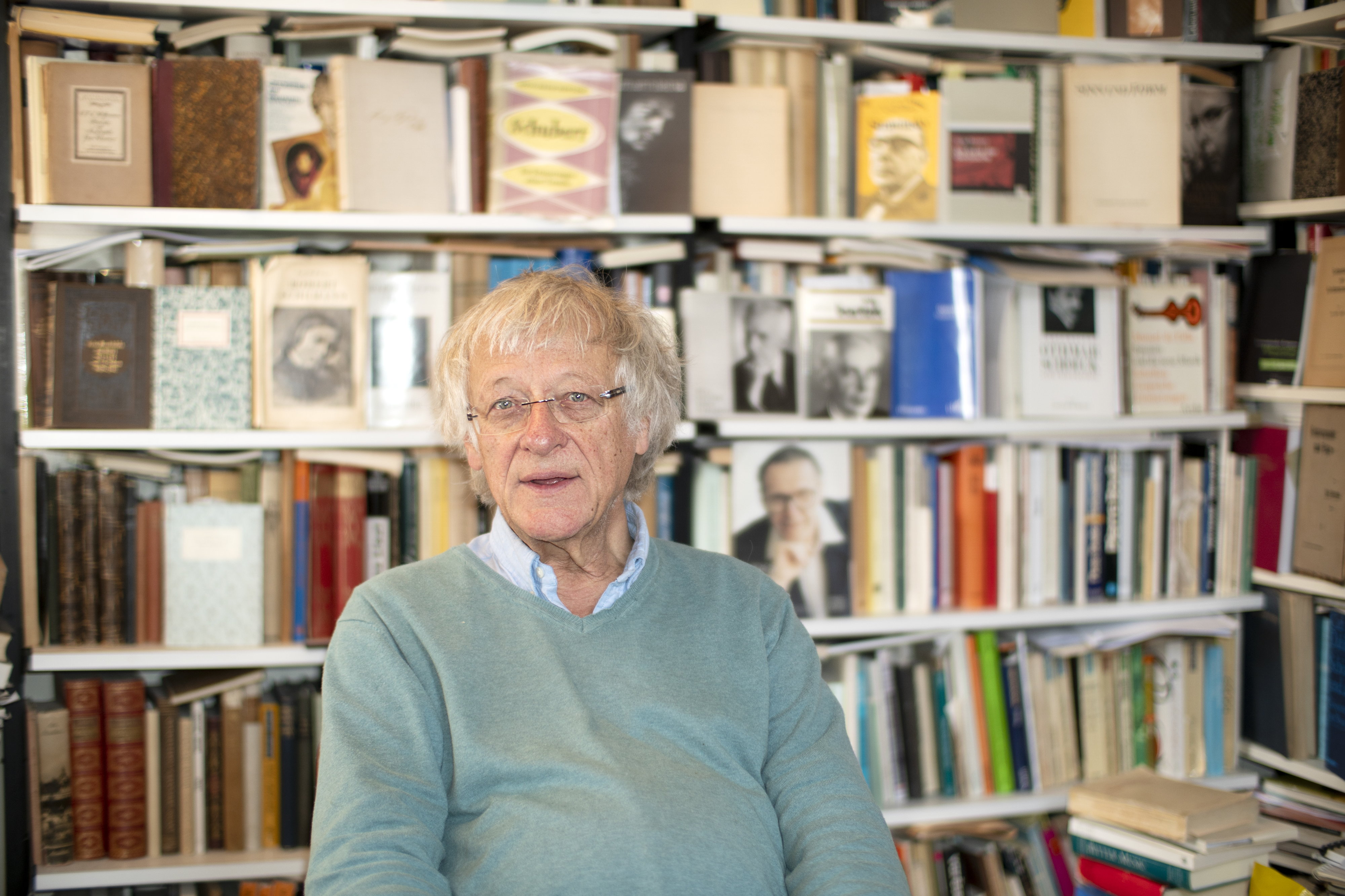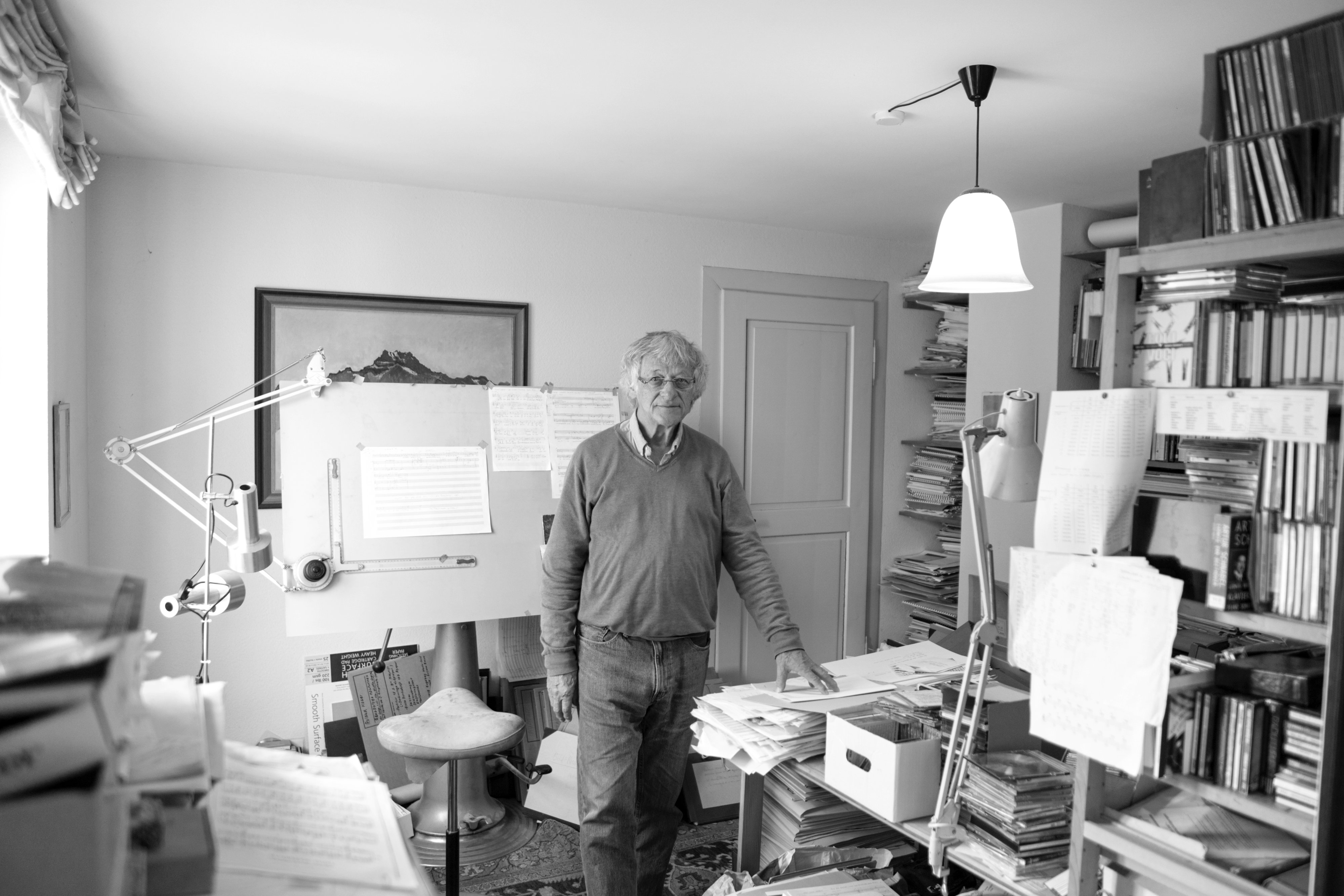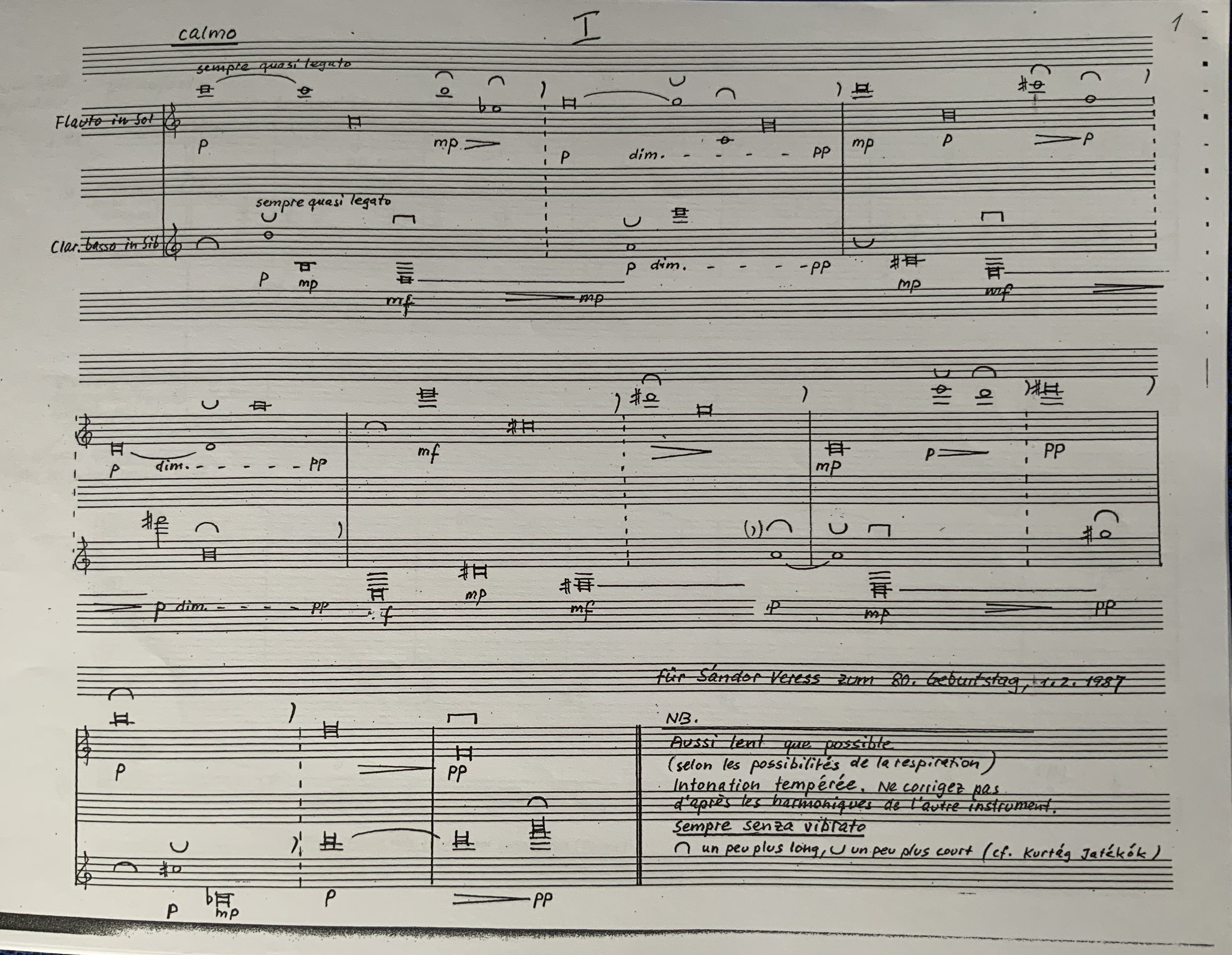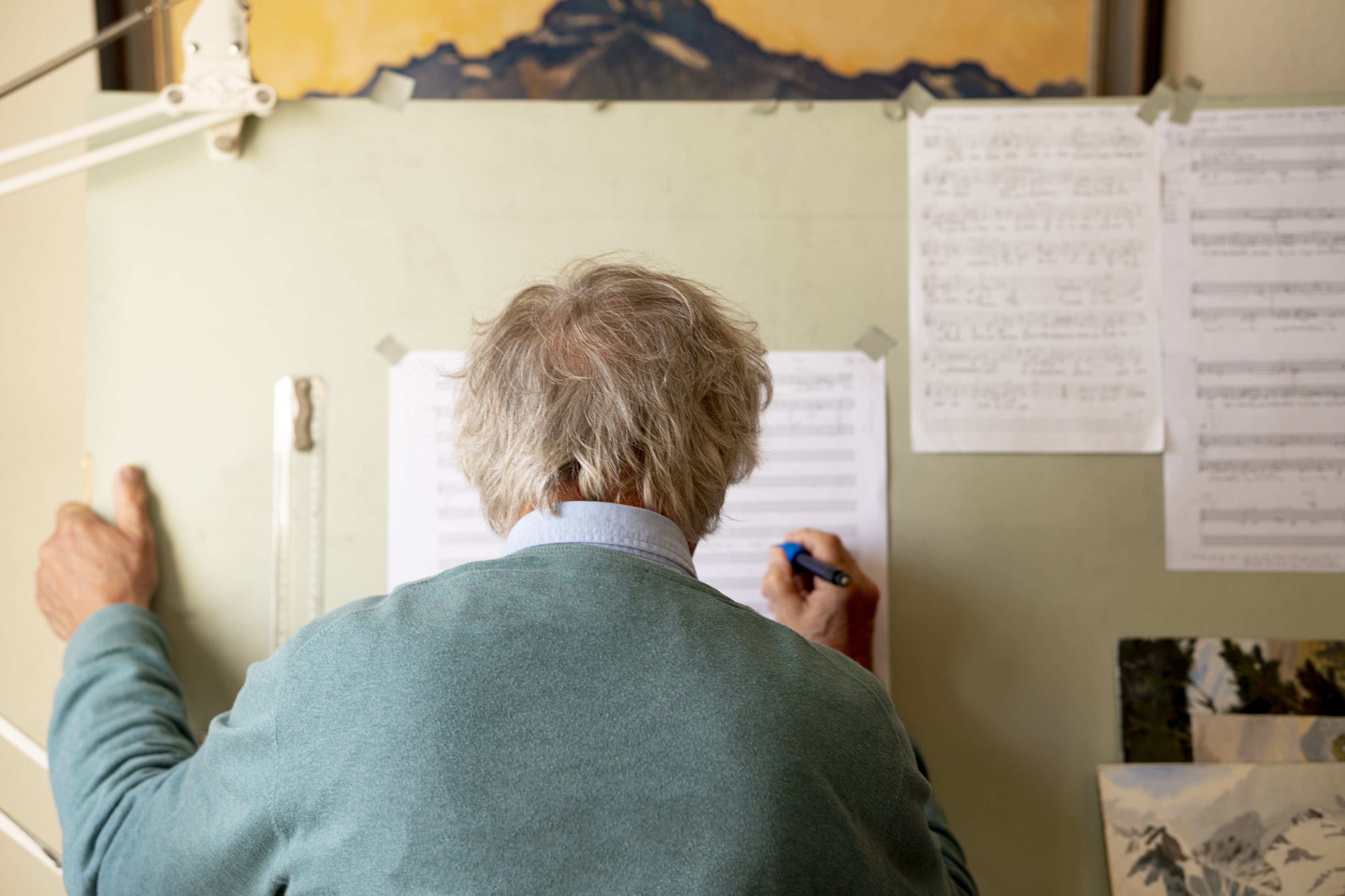Composer, performer and curator Alexandre Babel has been awarded one of the Swiss Music Prizes of the Federal Office of Culture 2021. The award ceremony took place in Lugano on September, 17 2021. In this interview, Babel explains his point of view on composition and curation and how he combines these two activities.
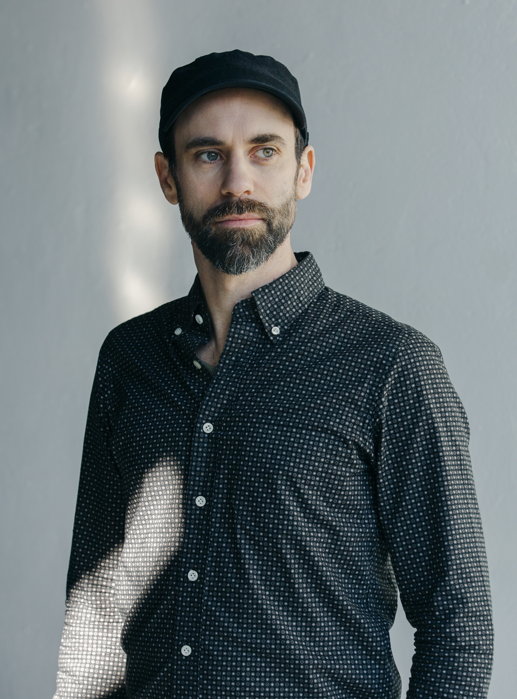
Gabrielle Weber
Alexandre Babel, percussionist, composer and curator, can be seen on avant-garde concert stages, at jazz festivals, in galleries and at art biennials. Based between Berlin and Geneva (his hometown), he combines classical avant-garde music, sound art, experimental improvisation and performance.
There are as many ways of composing as there are composers, says Babel and he therefore prefers to define composition as “the organisation of sounds in time and space”. Curating is also close to this understanding of composition. “Same here, it’s all about setting existing sound objects in motion in a certain place at a certain time and then connecting these objects with other objects.
Composing and curating are different aspects of the same activity. Babel creates, conceives, stages, networks and interprets.
Alexandre Babel, born in Geneva in 1980, first found his way to jazz through drum lessons in Geneva. He then specialised in New York with jazz legends such as Joey Baron or Jeff Hirshfield and played in various formations. “What fascinated me about jazz was not just the aesthetics, but rather how musicians interacted to create music. Mixing repertoire and improvisation: that was the basis of making music for me.”
Also being attracted by the classical avant-garde, Babel soon switched to classical percussion and, back in Europe, found his way to composition. John Cage, Morton Feldman, Alvin Lucier, Heiner Goebbels or Helmut Lachenmann were the ground-breaking figures and inspirators in Babel’s compositional path.
From his very first pieces already, such as music for small audiences for snare drum solo, the importance of the performer plays an important role.
“Music for small audiences was the beginning a real love affair between me and the snare drum..”
In one of his first pieces, ‘music for small audiences‘ Babel explores new sounds for solo snare drum and brings the role of percussion in the music business into focus.
Performer – Improviser – Composer
As a drummer, Babel is a touring musician wearing many hats: a fine, quiet improviser, loud, experimental drummer, for example with the band “Sudden infant” in a duo with Joke Lanz, or an interpreter of contemporary drum repertoire in various formations.
Additionally, he composes, curates and develops projects for his own formations, such as the Berlin collective Radial, together with video artist Mio Chareteau.
“To make music includes several processes in my opinion. First of all ‘thinking’ the music, which means composing, then transmitting the music and finally perform it for an audience: I’m fascinated by all of them.”
All of his activities are linked by a convergence of creation and interpretation, as well as an interest in the visual, spatial and performative aspects.
“What do I want to see and what do I want to hear…. ”
For Babel, composing always begins with or even boils down to an encounter. Thus, his compositions are mostly created for specific musicians.
He always has the performers in mind when writing and is also inspired by their movements and gestures. In the piece The way down for Duo Orion, for example, Babel took the duo’s interplay as starting point and staged it acoustically and also performatively.
Alexandre Babel, The way down pour violoncelle et piano, Duo Orion (Gilles Grimaître, piano, Elas Dorbath, Cello) 2020
“At the beginning of a project I ask myself: ‘What do I want to see and what do I want to hear’: To me, the visual side is just as important as the sound. Duo Orion, for example, has a special physicality when performing. I developed a piece for them in which the gestures are almost athletic. It almost became dance or a choreography,”.
Curating as a permanent dialogue
Babel says that his three activities – composition, interpretation and curation – have ideally come together in the artistic direction of les amplitudes Festival (La-Chaux-de-Fonds, autumn 2020). “I had the chance to combine all aspects within one object -the festival and at the same time the city of La Chaux-de-Fonds: I thought of the festival as a giant composition in separate parts – an art exhibition, live performances, drum sets and spatial compositions blending together in one new unity”.
Since 2013, Babel has led the percussion ensemble Eklekto Geneva Percussion Center, consisting of some 20 musicians in a loose line-up. “Eklekto offers me the opportunity to develop unusual percussive situations. All projects are created in close exchange and collaboration with the composers and the musicians. “Curating is a permanent dialogue with the musicians involved”.
Attentive listening
Pauline Olivero’s piece Earth ears, a so-called ‘Sonic Ritual‘ from 1989 for free instrumentation, is characteristic of Babel’s understanding of curation: “The musicians play by ear and there is no written score. One has to listen to himself as well as to the whole ensemble and react to it. The piece is about sound, space and attentive listening: to me, those are the basics of making music”.
Pauline Oliveros’ piece ‘Earth ears’, a ‘sonic ritual’ and openly interpretable piece from 1989, is characteristic of Babel’s approach to curation.
Another important project is his large percussion ensemble with 15 percussionists from the Eklekto pool. “We have clear rules: we play by heart and there is no conducting: playing without a leader creates an enormous energy and presence and at the same time opens up new ways of communication, in an almost radical way”.
Choeur mixte reflects the classical setting of chamber music and at the same time puts the often underestimated classical instrument ‘snare drum’ in a new spot-light. Another declaration of love to the snare drum.
In the piece ‘choeur mixte’ for 15 snare drums, the percussionists play their instruments standing in the shape of a wedge, on a lit, empty stage. They act strongly in relation to one another and the piece radiates power as a group and at the same time individual responsibility of the performers.
Music without sound
Among other things, Babel is currently working on a composition commissioned by the Venice Art Biennale 2022, designing the Swiss pavilion together with Swiss-based Franco-Moroccan visual artist Latifa Echakhch. Babel faces a special challenge in this case, as Echakhch wants him to create a composition without real sound. “This is an important and special task for me: through the joint creation process, we are approaching solutions on how music can sound without sound,” says Babel. At the moment, short pieces of music are being created for this purpose, which will form the basis for the final Music of Silence. Gabrielle Weber
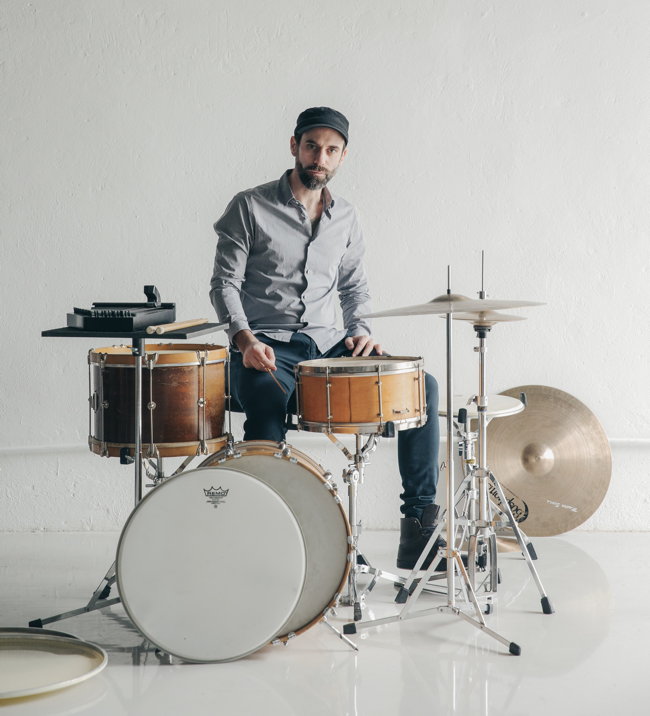
On Friday, September 17, 2021, the Swiss Music Price ceremony will take place at Lugano Arte e Cultura (LAC) in Lugano. During that weekend, some of the prize winners will perform as part of Lugano’s Longlake Festival.
This year’s Grand Prix musique went to Stephan Eicher.
The other prize winners are:
Alexandre Babel, Chiara Banchini, Yilian Canizares, Viviane Chassot, Tom Gabriel Fischer, Jürg Frey, Lionel Friedli, Louis Jucker, Christine Lauterburg, Roland Moser, Roli Mosimann, Conrad Steinmann, Manuel Troller and Nils Wogram.
Concerts Alexandre Babel:
Sunday, 19.9.21, 10:30h at Studio Foce, Lugano:
Alexandre Babel e Niton +ROM visuals
23.4.-27.11.2022 Biennale Arte Venezia: Alexandre Babel & Latifa Echakhch @Swiss Pavilion Venezia Biennale
Joke Lanz, Joey Baron, Jeff Hirshfield, Pauline Oliveros, Biennale Arte 2022, John Cage, Morton Feldman, Alvin Lucier, Heiner Goebbels, Helmut Lachenmann, Latifa Echakhch, Kollektiv Radial, Mio Chareteau, Elsa Dorbath
Sendungen SRF 2 Kultur:
in: Musikmagazin, 18./19.9.21: Alexandre Babel – Träger BAK-Musikpreis 2021 im Gespräch mit Gabrielle Weber, Redaktion Annelis Berger
Musik unserer Zeit, 16.6.21: Alexandre Babel – Perkussionist, Komponist, Kurator, Redaktion Gabrielle Weber
neoblog, 14.10.2020: La ville – une composition géante, Text Anya Leveillé
Neo-Profiles:
Alexandre Babel, Les amplitudes, Eklekto Geneva Percussion Center, Duo Orion, Gilles Grimaître


